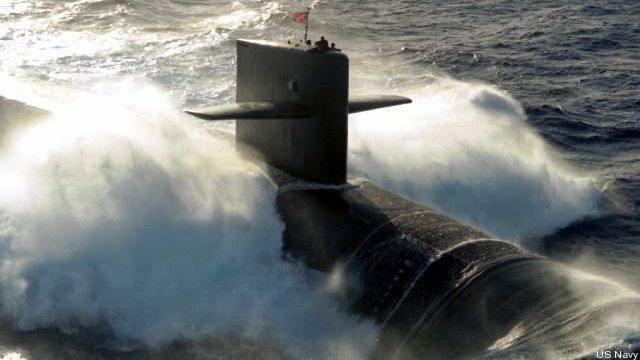Nuclear Cheating Scandal Hits Navy; Not Like Air Force’s, Say Admirals
Posted on

WASHINGTON: It looks like the scum of scandals that’s afflicted the Air Force nuclear program has spread to the Navy — although top admirals took pains today to emphasize how different the two problems are.
In both cases, military personnel cheated on exams to requalify so they could continue to work with nuclear materials. The Air Force has suspended 92 commissioned officers who served in nuclear missile silos at Malmstrom Air Force Base in Montana. The Navy did not give a number of individuals under investigation — “I was made aware of this incident yesterday,” Adm. John Richardson, director of the Naval Nuclear Propulsion Program, told reporters this afternoon, “we’re just getting started.” But the Navy’s cheating case involves senior non-commissioned officers serving as instructors at the Navy’s school for nuclear reactor operators in Charleston, South Carolina. Nukes are nasty however you package them, but a nuclear reactor is less dangerous than a nuclear missile, if only because it isn’t designed to explode.
Regardless of how much the two service’s experiences may differ, the fact remains that this provides more evidence of what appear to be serious problems in some elements of America’s nuclear forces. While the Air Force’s failings involved those who would fire nuclear weapons and the Navy involves those who deal with reactors, they both involve personnel with intimate knowledge of and access to nuclear materials.
A source with detailed knowledge of the Navy’s nuclear submarine force noted that all reactor and weapons experts are issued Q clearances, although need-to-know restrictions mean that a reactor expert is unlikely to have the detailed knowledge about a warhead that a weapons officer would.
The Navy scandal probably means Defense Secretary Chuck Hagel will feel compelled to widen the search across the nuclear enterprise — both weapons and reactors — for problems and ways to fix them as the review he ordered gathers steam. The Navy scandal comes at a particularly bad time as many in the Pentagon — including, privately, some Air Force officers — were talking of the Navy as a model for Air Force reforms. This will raise doubts about that course of action.
The source with nuclear experience recommended that Defense Secretary Chuck Hagel order his nuclear review team to cast their nets wide, given the nuke force’s tradition of “circling the wagons.” As did Air Force Secretary Deborah Lee James, the nuclear source pointed to the military’s culture of zero defects as a likely cause of the scandals.
How seriously the Navy is taking this was shown by the presence of the Chief of Naval Operations, Adm. Jonathan Greenert, next to Adm. Richardson. Greenert is a bubblehead, as nuclear submariners are known. “We will remain vigilant. We will continue to drive home to our people the importance of integrity,” he said. “It is the foundation, at sea, in port, and certainly in this program.”
What’s more, the admirals emphasized, they found out about the problem because a sailor who was asked to participate in the cheating ring reported on it instead. (The details weren’t clear but presumably he or she was offered test answers). That’s another contrast with the Air Force — though the admirals didn’t say it aloud — because that cheating scandal was only discovered by accident during an investigation of drug use at the nuclear silos.
The Air Force’s problems prompted Defense Secretary Chuck Hagel to order a two-pronged review of the entire nuclear enterprise, but that review was not what caught the Navy’s cheaters. “This did not come forward as a consequence of that,” Richardson said. “This was a sailor who has been fully trained from the moment he enters boot camp that integrity is a foundation of our Navy’s operations.”
“What motivated the sailor to come forward?” said Richardson. “We have a steady drumbeat in the Navy, and particularly in the Navy nuclear propulsion program, that stresses the importance of integrity.”
“We generally are pretty forceful about holding people accountability,” he added. “Our history is, if you’re caught in an integrity violation you’re removed from the [nuclear] program and, generally, out of the Navy.”
The admirals also emphasized the Navy’s three-layered certification process in which no one test was as crucial for promotion as the ones the Air Force officers felt compelled to cheat on. “Our exam program is different than the one you’ve mentioned for the Air Force,” Richardson said in reply to one reporter. The personnel who operate naval reactors on aircraft carriers and submarines (no other vessel currently has them) must pass a written test, an oral exam, and a hands-on practical exam in which they stand a watch under careful supervision. They also have to do this repeatedly throughout their career. The instructors under investigation would have gone through this three-step evaluation at least three times:
- when they were students themselves, qualifying to work on reactors in general;
- on their first fleet assignment to an actual sub or ship, to certify their ability to handle that vessel’s particular reactor;
- and on their arrival at the school to serve as instructors, to certify them on the school’s two training reactors.
Both those school reactors, by the way, are now shut down until Richardson and Navy investigators are satisfied everything is safe. Expect the Navy to hold commanders responsible. It’s how the service maintains and encourages accountably. Our nuclear expert said there’s been a spike in the number of people who have had clearances stripped since the Navy Yard shootings last year. Given that, expect most of those found to have cheated to lose their clearances and, probably, their careers in the Navy.
Subscribe to our newsletter
Promotions, new products and sales. Directly to your inbox.
